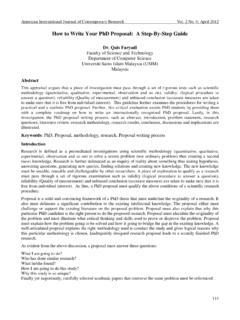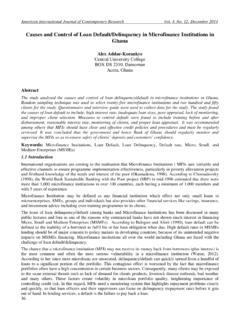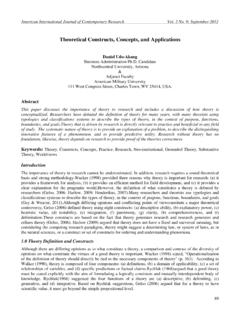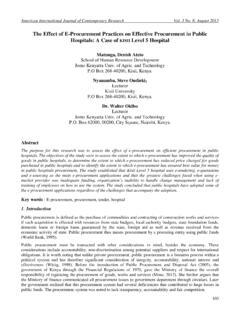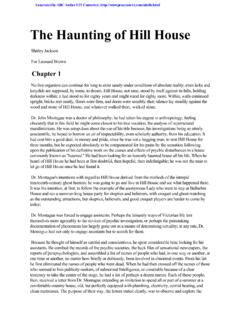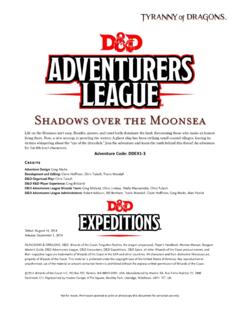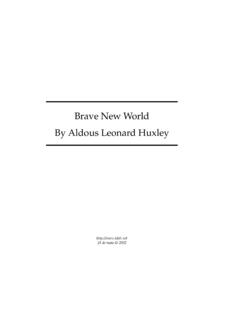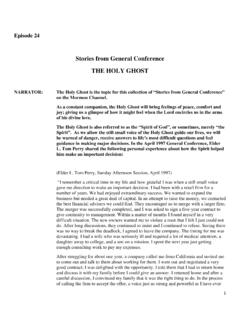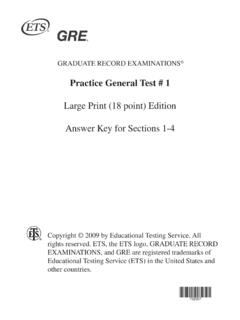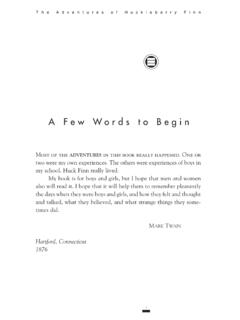Transcription of The Genre of Horror
1 American International Journal of Contemporary Research Vol. 2 No. 4; April 2012 132 The Genre of Horror Mgr. Vikt ria Proh szkov Department of Massmedia Communication University of Ss. Cyrill and Method Trnava Abstract The study deals with the Genre of Horror , outlining it and describing the dominant features and typological variations. It provides a brief overview of the development process in the realm of literature, film and computer games and outlines its appearance in other fields of culture and art. It characterises the readers and viewers of Horror works and their motives for seeking the Genre . The thesis wants to introduce the Genre , its representants in Slovak and Czech literature. Key words: Genre , subgenre, Horror , dread, short story, novel, film, writer, director, game, violence, blood, danger, mystical, supernatural phenomenon, ghost, monster, vampire, zombie, werewolf, murderer.
2 1. Introduction The oldest and strongest human emotion is fear. It is embedded in people since time began. It was fear that initiated the establishment of faith and religion. It was the fear of unknown and mysterious phenomena, which people could not explain otherwise than via impersonating a high power, which decides their fates. To every unexplainable phenomenon they attributed a character, human or inhuman, which they associated with supernatural skills and invincible power. And since the human imagination knows no limits, a wide scale of archetypal characters have been created, such as gods, demons, ghosts, spirits, freaks, monsters or villains. stories and legends describing their insurmountable power started to spread about them. Despite the fact by the development of science many so far incomprehensible phenomena have been explained, these archetypes and legends are still being used in literature and other branches of art.
3 three genres are based on fear and imagination: science fiction, fantasy and Horror , which together form a so-called fantastic triangle. It is why they so often overlap and enrich themselves. 2. Horror as a Genre The definitions of the Genre of Horror differ. Many authors have tried to create a definition that would be able to completely distinguish and separate Horror from the similar and close genres science fiction and thriller. However, they always encountered difficulties as the attributes that refer to one Genre can be also found in the other one. To characterize Horror , as a Genre that invokes tension in recipients is not accurate enough, as science fictions, thrillers, detective and crime stories initiate the feeling of suspense as well. The same is to be said about the emotion of fear or the display of blood, which are another attributes of Horror production but can be found in the other mentioned genres, too.
4 In his work An Introduction to Studying Popular Culture Dominic Strinati created the following definition that characterizes Horror as a Genre that represents the need for suppression if the Horror shown is interpreted as expressing uncomfortable and disturbing desires which need to be contained. 1 Horror is a varied Genre that is hard to be defined by one single definition. And therefore the most accurate is the one that defines Horror through each of its categories and its subgenres. Todorov distinguishes between three forms of Horror as a Genre : uncanny, marvelous and fantastic. In the first category the uncanny, the end of the story contains elements of supernatural, events that seem to be unreal, impossible or irrational, or events that follow the laws of rational but are incredible, disturbing, unusual, shocking, unexpected or unique. 1 Strinati, D.
5 (2000) An Introduction to Studying Popular Culture. New York, Londong: Routledge, p. 82 Centre for Promoting Ideas, USA 133 The viewer/reader has an opportunity to explain them in their own way. Yet the laws of reality remain untouched. Examples of this category are the following films: Taste of Fear (1961), Nightmare (1964), Psycho (1960), or films that overlap with the Genre of science fiction. Extraterrestrials can be inhuman but not unnatural; they represent the boundaries of human knowledge. In the second category the marvelous Horror , seemingly irrational and incomprehensible phenomena can be explained only by accepting the second layer of reality the supernatural while the story lasts. To explain the incomprehensible phenomena of the story we must accept the new laws of nature.
6 Films of vampires, werewolves, living dead, demons etc represent this category. The third category the fantastic Horror does not allow us clear explanations of the irrational; it offers us several alternatives. The viewer/reader can decide whether they will explain the phenomenon as the existence of the paranormal or as a hallucination of the main protagonist. The fantastic Horror raises doubts and hesitation between the natural and supernatural alternative, which the recipient may (or may not) share with the character. Examples are film such as Shining (1980), Cat People (1942) The Innocents (1920) or I Walked With a Zombie (1943). 2 3. Subgenres of Horror Rural Horror , also known as redneck Horror , is not related to specific locations only (such as villages or country). It is the Horror that is situated in places far from civilization, which also includes a local legend, myth or superstition.
7 These are horrors such as Hills Have Eyes (1977, remake 2006, sequel 2007), The Evil Dead (1981), Cabin Fever (2002), Deliverance (1972) or Wrong turn (2003). Cosmic Horror is mostly characterized by the work of Howard Phillips Lovecraft. In his books he wrote of a civilization coming from outer space, which conquered the Earth before humankind. Cosmic Horror implies elements of science fiction and depicts emotions when a person finds out something he would rather not know about. Including Lovecraft s works we can also mention the works of Clive Barker, Peter F. Hamilton or The King in Yellow by Robert W. Chambers. Apocalyptic Horror deals with the end of the world caused by various factors. Therefore it is also called the end-of-the-world Horror and it is represented by works such as The Stand of The Cell, by Stephen King or the works of Robert McCammon. Crime Horror compounds the elements of crime/detective story and Horror .
8 It is based on a criminal plot and escalating tension with an addition of Horror elements. This category includes films as Resurrection (1999) Se7en (1995) or the Italian Tenebre (1982). Erotic Horror combines the sensual or sexual imagery with Horror overtones or elements of the plot. The most famous archetypes of the erotic Horror are the vampires. Authors such as Wrath James White, Lucy Taylor, Clive Barker, Anne Rice, Michael Garrett, Amy Wrench or Jeff Gelb represent this subgenre. Occult Horror focuses on exorcism, the arrival of the antichrist, cults, mysticism, curses and a wide scale of so called occult sciences. Horrors such as The Exorcist (1973 and the related sequels and prequels), Constantine (2005), The Amityville Horror (2005), The Omen (1976, remake 2006) or Final Destination (2000) are only a few examples representing this subgenre. Psychological Horror is based on the fear of the main protagonist, on his feelings of guilt, on his faith and unstable emotional state of mind.
9 Further on it develops the plot, the tension and Horror as seen in films such as The Sixth Sense (1999), The Blair Witch Project (1999), American Psycho (2000), Harris s cannibal series about Hannibal Lecter Red Dragon (2002), Silence of the Lambs (1991), Hannibal (2001) and Hannibal Rising (2007); The Ring (2002, which is the American remake of the original Japanese Horror Ringu from 1998) or the novel of Stephen King called Gerald s Game. 2 Todorov, T. (1973) The Fantastic: A Structural Approach to a Literary Concept. IN: Strinati, Dominic. (2000). An Introduction to Popular Culture. New York, Londong: Routledge, American International Journal of Contemporary Research Vol. 2 No. 4; April 2012 134 The aim of the surreal Horror is not only to tell a terrifying story, but to disturb the recipient as well. Besides the classical elements of Horror this subgenre also contains elements of surrealism: dreaminess, grotesqueness, bizarreness and the fantastic.
10 Good examples are the works of David Lynch or David Cronenberg, Jacob s Ladder (1990) or Angel Heart (1987). The visceral Horror is the most shocking and disturbing of all the subgenres of Horror . It is full of blood, gore and brutality. It depicts the most disgusting and most perverse forms of murder, butchering and mutilation of human body. Films such as The Texas Chainsaw Massacre (1974, its sequel, remake and prequel), Saw (2004 and the following sequels), Hostel (2005 and the following sequels), or the works of Jack Ketchum are the most famous representatives of this subgenre. 3 4. Literature of Horror The beginnings of the Genre of literature of Horror can be derived from the formation of the tradition of gothic literature, which rose in the 18th century. However, the very beginning of the Horror is connected with the works of English authors, who followed and developed the gothic tradition.
